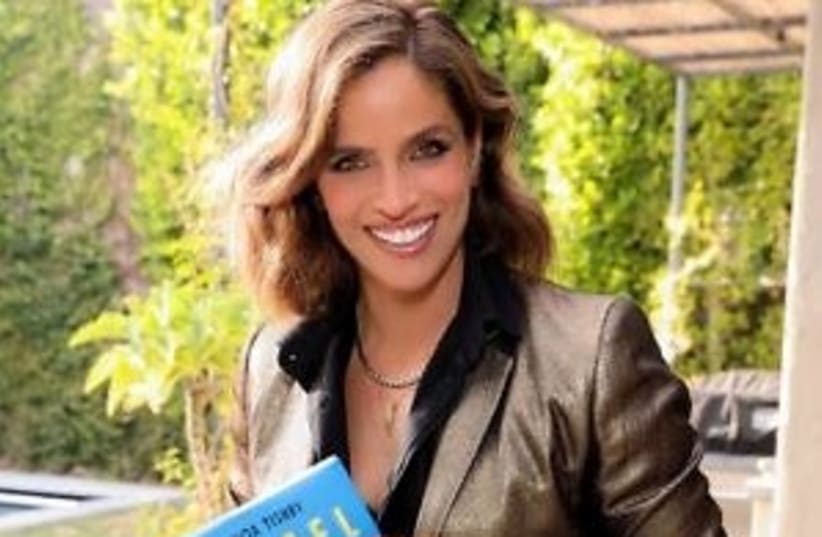Israeli expat Noa Tishby seeks to set straight her fellow secular liberals in Hollywood and on college campuses when it comes to her natal land. To that end, in recent years the actress-producer-model-singer has exchanged her multiple passions for a singular purpose: advocacy. Epitomizing her hasbara brand, Israel: A Simple Guide to the Most Misunderstood Country on Earth is a guide for those perplexed by the State of Israel.
In synoptic fashion, the book summarizes the Zionist movement, the state’s establishment, the sundry wars between Israel and her neighbors, the bloody intifadas, the fruitless peace negotiations, the fruitful peace treaties, and Israel’s conflict management, warts and all.
In indicting her work, the authoress unconventionally infuses her account with personal and familial anecdotes and manifests her diplomatic DNA (her grandfather Hanan Yavor was Israel’s ambassador to Ghana, Nigeria, Liberia, and Barbados), thereby casting herself in the lead role of amateur diplomat. Tishby’s authorial persona is articulate and passionate, vulnerable and savvy; her narrative is by turns compelling, profane, humorous, and brash, oscillating from describing Masada as “in the middle of bum-F nowhere” (“west of the Dead Sea” is serviceable) to this heartrending admission: “I have lived my entire life thinking that I was a mistake.” Tishby foregrounds throughout salient facts including the intentional invention for political purposes of the “Palestinian” identity in 1964, and deftly derides virtue-flaunting poseurs on “social media, where everyone has an opinion and facts aren’t as important as adopting a seemingly noble cause – an admirable cause, one that makes you look like you actually care abo
ut humanity.” The text is most trenchant in its chapter on BDS, wherein the nefarious campaign’s financial sources and ties to Hamas are highlighted.
As a “liberal secular humanistic person,” Tishby pays homage to the “two-state solution,” without elucidating that the true two-state solution for the region came and went in the aftermath of the San Remo conference in 1920, when Transjordan was unilaterally ceded to the Arabs by British Foreign Secretary Earl Curzon and High Commissioner Herbert Samuel, and that what is routinely touted today as the “two-state solution” is by now the four-state solution (the three Palestinian Arab states of Jordan, Gaza, and “Palestine” in Judea and Samaria, and the one Jewish state of Israel). She insists Palestinian Authority President Mahmoud Abbas is “moderate” (the same Abbas who directs the pay-to-slay “martyrs” fund for Palestinian terrorists). While her criticisms of the ultra-orthodox are unobjectionable, her comparing them to the militant Zealots of Roman Judea is historically inapt.
But the book’s accent on political Zionism and modern Israeli history is its intrinsic shortcoming: the biblically averse, secular liberal schema elides or downplays the first 3,900 years of Jewry’s 4,000-year history and attachment to its ancestral homeland, in effect replacing the patriarch Abraham with the playwright Theodor Herzl and Moses with David Ben-Gurion, as if the Children of Israel’s connection to the Land of Israel commenced when the assimilated Herzl finally set down his strudel à la mode and took up his pen. This is not to imply that nonreligious advocates must resort to a religious perspective, but rather to a holistic historical one that does not shunt ancient, classical, medieval, or early modern Israel (which is precisely what anti-Zionists would have Zionists do), thereby egregiously truncating the case for Israel from the outset. The State of Israel is the third commonwealth, not the first; for good reason is the State of Israel where it is, and not in Alaska or in Birobidzhan. Tishby rightly notes Jewry’s indigenous roots to the Middle East, but dilating on this paramount premise for her uninitiated readership would have undergirded the book’s ambition.
In the Tanakh (Hebrew Bible), the original Tishby (Elijah the prophet) roamed the Kingdom of Israel, zealous for the God of Israel; three millennia later our modern Tishby roams Tinseltown, zealous for the State of Israel. In the Talmud, stumped sages declared “Tishby [Elijah] will resolve the difficulties and problems.” Fifteen centuries later our modern Tishby has arrived to resolve the difficulties and problems challenging those stumped by the Middle East. Unlike her eponym, this namesake is not expected to herald the messianic era, though she may well help usher in a new awakening and a heightened awareness among novices glaringly ignorant of Israel’s history and destiny. It redounds to her credit that, alert to slanders and libels against the Jewish state, this guardian of Israel neither slumbered nor slept.
As “a history-ish book,” Israel: A Simple Guide to the Most Misunderstood Country on Earth is a useful resource for young adults and open-minded liberals of all ages interested in the realities and intricacies of modern Israel. The book includes seven maps, an appendix, a glossary, endnotes, and an index.
Israel: A Simple Guide to the Most
Misunderstood Country on Earth
Noa Tishby
Free Press/Simon & Schuster, 2021
352 pages; $27.99
